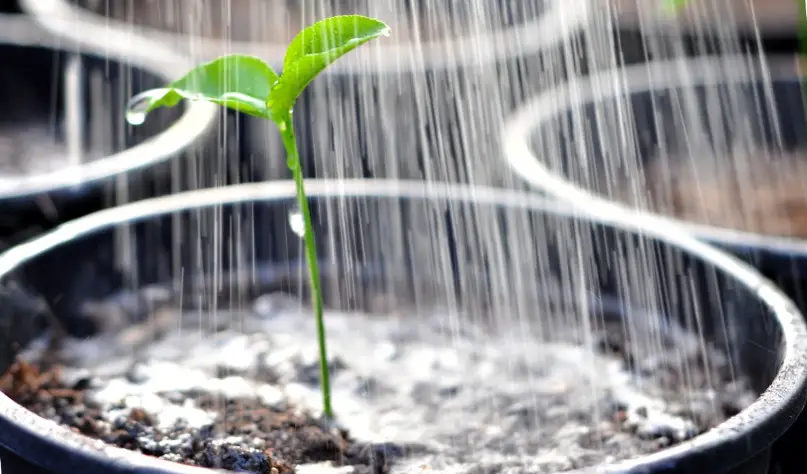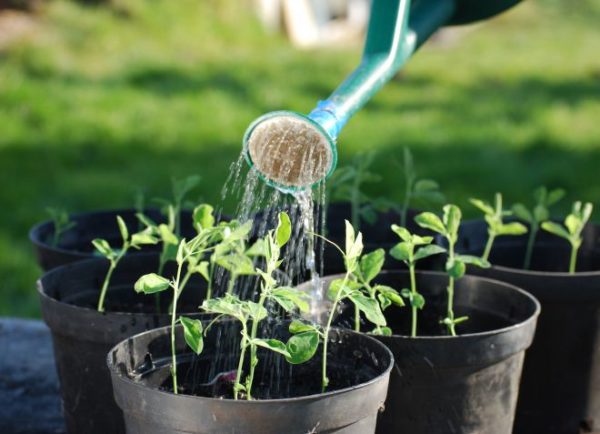Home comfort consists of many components. Someone cares about decorating the premises, complementing the room with soft sofas and pillows. For some, an ascetic setting with a minimum of items and accessories is enough. But without flowers, the house looks dull, boring. Home flowers fill the rooms with freshness, cheer up and give a lot of pleasant emotions. But so that the indoor plants do not get sick, remain green, and bloom more often, they are watered, and how to fix hard water for plants? let discuss this in detail.

How To Fix Hard Water For Plants?
First let discuss fixing hard water plants. Florists offer several options for resolving the problem:
- Defend water before watering. In the process of settling, chlorine compounds volatilize. But a small part of trace elements remains in the water, which accumulates in the soil. After six months of watering with settled hard water, the plants begin to hurt. In order to prevent death, they are transplanted every 1-1.5 years, completely changing the drainage and soil.
- Use boiled water for irrigation. In such water, the chlorine content is minimized, which is beneficial for home flowers. But due to boiling, not only chlorine leaves the water, but also a large number of useful substances, including dissolved oxygen.
- Use water filters. The best option for apartments where the chlorine content does not exceed the norm. If the water is too hard, then you will have to change the filter not once every 3 months, but once a month. Boiled water is not the best way to water plants.
To remove plaque from the kettle, wash the mixer and faucet from the scale, use citric or acetic acid. Water is poured into the kettle, 1 tbsp is added. l. 70% vinegar or citric acid powder, boiled. Then the water is drained and the kettle is rinsed. Mixer, taps are wrapped with a rag soaked in a solution of 0.5 tsp. acetic acid or citric acid powder and 1 liter of water. Work with gloves!
Citric acid is a simple chlorine neutralizer in water
The easiest way to remove heavy chlorine from your flower water is to add some citric acid. Chlorine makes the liquid alkaline, hard, and citric acid leaches the composition, makes the water soft.
Water softened by “lemon” is well absorbed by plants, prevents the appearance of chlorosis, a white crust on the ground. Soft water dissolves nutrients in the soil better, making it easier for home flowers to “feed”.
The optimal amount of citric acid is 1/2 tsp. 5 liters of ordinary hard water from the tap . And a few more tips:
- It is recommended to increase the concentration of citric acid only for varieties growing in acidic soils: azaleas, hydrangeas, calla lilies, camellias, and some types of roses.
- It is possible to reduce the dose of citric acid or not add at all for spathiphyllum, Decembrist, dieffenbachia. These crops grow well in alkaline soils. Water is alkalized with “lemon” only if it is very hard in the tap.
In other cases, the already indicated dosage is enough: 0.5 tsp. for 5 liters of ordinary water. If the tap water is soft enough, there is little chlorine in it, citric acid is not added at all or the concentration is made to a minimum, within 1/4 tsp. for 5 liters of water.
Here is a detailed guide on Choosing Pots For Indoor Plants?
what type of water is best for plant growth?
The first thing a grower should take care of is the location of the pot with the plant. Some cultures prefer sunny windowsills, while others thrive in shaded corners.
The second is watering. The regularity of watering is determined by the type of crop, but as for water, there is one rule: the water for irrigation should be at room temperature with a neutral level of hardness. You water plant with soft water for proper growth.
is hard water bad for plants?
Tap water always contains lime, chlorine salts. Such moisture inhibits the absorption of nutrients, the plant gets sick, dies. Chlorinated water is called “the killer of all living things” for a reason. It is not recommended to drink the liquid without processing (boiling), use it for watering plants.
Why is water chlorinated? To remove biological particles, pollution. As a result of treatment, water flows through the pipes of the water supply “without infection”, but with a high content of free elements of chlorine, its compounds.

In the process of combining any biological substance with chlorine, a combustion process occurs. If you spray or water the plants with such moisture, the roots, green mass get burned. When water settles from the tap, chlorine volatile substances evaporate, but only in a small part, the rest of the microelements accumulates in the soil .
Want to know about is baking soda good for houseplants?
how to check hardness of water at home?
Hard water shows up as a white coating. It appears on the plumbing, scale forms in the kettle. You can notice plaque literally on everything cups, table surfaces.
For a person, the use of such water is fraught with a serious disease the formation of kidney stones .
When watering plants with hard water, the following signs appear:
- Chlorosis. The leaves begin to turn yellow and dry. Chlorosis causes disease of the roots of the culture. Chlorosis on flowers from hard water
- White stains on the ground. The whitish crust covers the soil surface tightly and reduces permeability. Plants don’t get enough oxygen and mold forms. Water with chlorine forms a white crust on the surface of the soil
